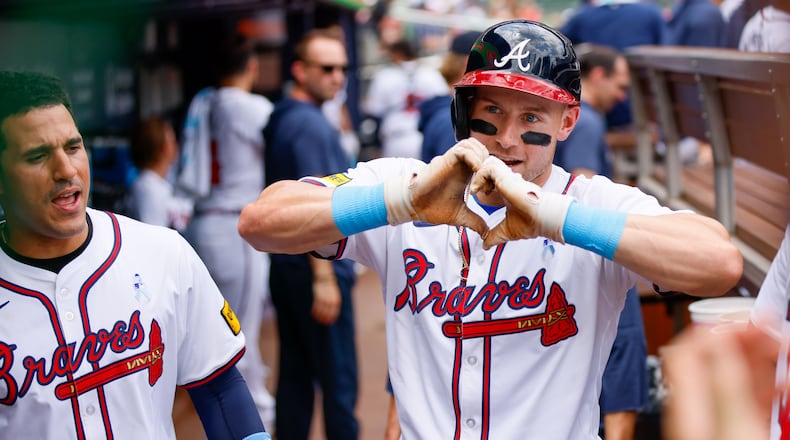After the Braves orchestrated a complex series of transactions to acquire outfielder Jarred Kelenic last winter, there was a recurring theme echoed around Truist Park: The top-prospect-turned-disappointment won’t need to play superman in Atlanta.
The pressure that’s followed Kelenic throughout his career, from top Mets prospect to touted Mariners youngster, had evaporated. He joined an organization spoiled with star power. He simply needed to fit a supplementary role.
“Look, obviously he’s had a lot of expectations, (was) highly touted and so on,” president of baseball operations Alex Anthopoulos said after making the deal. “We do think that this will be a good spot for him. We have a deep lineup. Whoever is in that lineup, you’re one of nine. There’s not any more expectation.”
Kelenic, feeling warmly embraced by fan enthusiasm during Braves Fest in January, reiterated the same thought: “When you’ve got a lineup like that just filled with talent, you have guys that can just go out and do their job, and I think it’s a recipe for greatness. I’ve had a lot of expectations in other places, people saying things and all that, and I’m trying to just tune all that out because I’m just going to go out and be who I am.”
Well, the Braves still don’t need Kelenic to be an All-Star. But he’s a whole lot more important than he was perceived several months ago.
In mid-March, the Braves signed Adam Duvall, which made Kelenic a platoon player (he was having a statistically poor spring at that time, which the Braves said had nothing to do with signing Duvall, a player with whom they were familiar and loved).
Kelenic, facing only righties, had some immediate success, hitting .288 in April before falling into a lull (.235 average with a .691 OPS in 26 games from June 8 to May 3). His season largely embodied the frustrating ups and downs of his career.
A couple of injuries changed Kelenic’s outlook. First, reigning National League MVP Ronald Acuña Jr. tore his ACL in late May. The Braves decided to split the Duvall-Kelenic platoon and left field belonged to Kelenic, just as it was supposed to entering spring training. Center field Michael Harris II and second baseman Ozzie Albies, meanwhile, were given the impossible task of replacing Acuña as the Braves’ leadoff hitter.
Then, last weekend, Harris suffered a hamstring strain. Hamstrings are tricky, which means Harris will be out for a lengthy period. And so Kelenic, who’d dabbled in center during spring training, took over as the center fielder.
That wasn’t his only increased responsibility. The Braves shifted him to leadoff, too. With Albies a better fit hitting second, it’s not like they had many other choices. “We’re running out of options,” manager Brian Snitker bluntly said last weekend about his leadoff decision.
He later added: “Things happen, and you have to ask (players) to do a little more than what you thought. But we’re deep enough into this that if (Kelenic is) going to do it, he’s ready for it now.” Snitker has praised Kelenic’s at-bats against southpaws (he’s 6-for-26 against lefties, whom he rarely faced earlier in the year) and feels he’ll continue growing more comfortable as the opportunities increase. That makes sense, but for now, it also is the only approach the Braves can take.
There’s no hiding Kelenic. He’s the leadoff man and center fielder for a World Series hopeful that’s riding a six-year streak atop the National League East. He no longer can be “just” a supporting cast member. The team needs him to be more. Early indications suggest he’s capable of it.
Kelenic homered in consecutive games to begin his leadoff tenure, which included a three-hit debut. Entering Wednesday, he’s 6-for-18 (.333) in four games atop the lineup. Designated hitter Marcell Ozuna, the Braves’ best player, has applauded Kelenic’s approach and preparation against each pitcher. He’s lowered his strikeout rate this month (25% in 52 plate appearances; almost 30% overall) and while he doesn’t get on base at an ideal rate for a leadoff man, his physical skills and steady improvement certainly make him the most logical in-house option.
“I’m just trying to treat it as one at-bat at a time,” Kelenic said. “That’s what I’ve been doing this whole year. It allows me to just be present in the box and makes me not get too big or let the lows get too low. It makes you stay even-keel and play chess against the pitcher.”
Kelenic has shown the necessary ability to be a spark. Take Tuesday for instance. Kelenic led off with a single and scored on Albies’ ensuing triple. It was his only hit of the night, but it helped the Braves to a 2-1 win.
“It’s a short sample size, but he seems to feel good there,” Snitker said Tuesday. “There doesn’t seem to be any panic in his at-bats. He’s had some really good at-bats. He’s gotten behind in counts and still got good decisions. I think he’s done a really, really nice job, as he has in center field, too.”
The Braves almost certainly are going to add an outfielder, if not multiple players, by the trade deadline. Kelenic will determine if he maintains such a sizable role. His success (or failure) also will heavily affect his team’s offensive output. So far, the Braves have reasons to be encouraged that he’s an adequate solution.
About the Author
Keep Reading
The Latest
Featured




